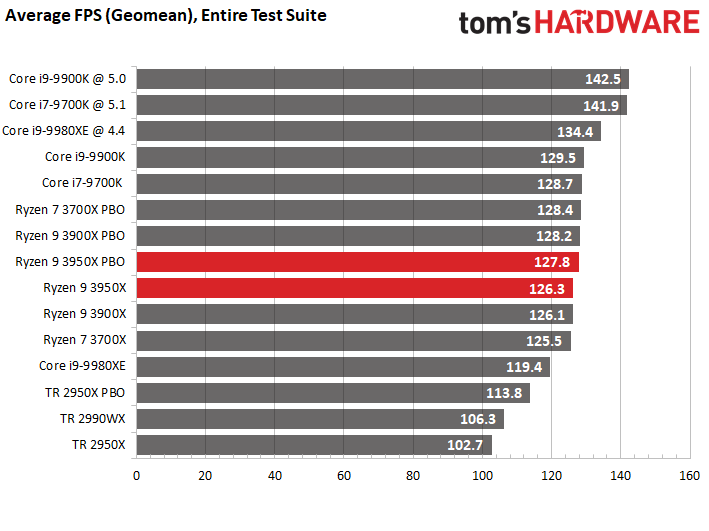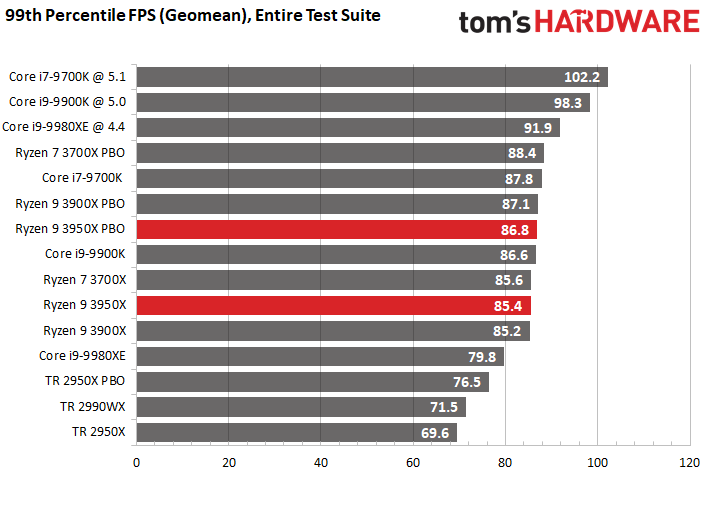Why you can trust Tom's Hardware
A New Class of Performance
High end desktop processors have long offered the ultimate in performance, as long as you were willing to pay the price. Aside from high MSRPs, the chips also require expensive accommodations, like beefy motherboards and the added cost of fully populating quad-channel memory controllers. Add in the inevitable trade-offs, like reduced performance in lightly-threaded applications and games, and most regular users who could use the threaded horsepower of a HEDT chip just settle for mainstream offerings.
Now AMD's Ryzen 9 3950X brings HEDT-class performance to mainstream motherboards, lowering the bar for entry. The 3950X carries a $749 price tag, but that is downright affordable compared to competing HEDT processors.
Intel's current lineup of Skylake-X Refresh chips are hideously overpriced by comparison, but AMD's pressure has brought about some change: Intel's forthcoming Cascade Lake-X chips cost roughly half the price of the previous-gen models, yet the 18C/36T Core i9-10980XE still slots in at nearly $200 more than the 3950X. You'll also need to spring for an X299 motherboard, while the 3950X drops into X570, X470, and B450 motherboards, though the latter might not be a good choice to feed enough current to this beast.
As a general rule, we don't recommend HEDT processors for enthusiasts that are only interested in gaming, they're best served by mainstream processors that are often faster in games, and the Ryzen 9 3950X also falls into the same category. However, if you're after a platform that can do serious work, but still be nimble enough for some entertainment afterward, the Ryzen 9 3950X fits the bill.
Below we plot the geometric mean of our gaming test suite in both average fps and 99th percentile values, the latter of which is a good indicator of the overall smoothness of your gaming experience.


The Ryzen 9 3950X provides more than acceptable performance for 1080p gaming, as a whole, and it is very competitive with Intel's chips. These deltas will shrink tremendously when paired with high-resolution gaming. Given the target audience, that class of gaming is almost a given.
We see the same performance trend throughout our suite of application tests: Unlike some Threadripper processors, there were no significant performance outliers in lightly-threaded apps that were worthy of alarm. Turn to heavily-threaded applications, like rendering and professional applications, and the Ryzen 9 3950X often outstripped those same Threadripper processors, not to mention Intel's flagship Core i9-9980XE.
Get Tom's Hardware's best news and in-depth reviews, straight to your inbox.
AMD says that it fully expects the Ryzen 9 3950X to be competitive with Intel's new -10980XE, but Intel also has its 14C/28T -10940X at $784, which aligns neatly with the 3950X's pricing. We're sure that you'll see reviews of both of those competing products shortly.
But we don't think those chips will change the landscape much, the Ryzen 9 3950X just has too much to offer at a much lower overall cost. A capable X570 motherboard doesn't come cheap, but you gain access to the PCIe 4.0 interface as a nice bonus. Budget in a beefy cooler to assure enthusiast-class performance from your chip, and AMD's Ryzen 9 3950X is truly in a class of its own.
MORE: Best CPUs
MORE: Intel & AMD Processor Hierarchy
MORE: All CPUs Content

Paul Alcorn is the Editor-in-Chief for Tom's Hardware US. He also writes news and reviews on CPUs, storage, and enterprise hardware.
-
jimmysmitty Page 4s top says "Insert Heading".Reply
So its about as expected with better boost rates but requires much better cooling due to the amount of cores. -
TheSecondPower "As a result, the 3950X doesn't come with a bundled cooler, a first for AMD's mainstream Ryzen chips." Actually none of the X processors from the Ryzen 1000 generation came with a cooler.Reply -
slash3 The Geekbench section states the score as 52,626 points in multi-core, but the graph shows 56,626.Reply -
Soaptrail Please include PCI-E 4 SSD in your comparison against the Intel HEDT cpu's when those arrive.Reply -
joeblowsmynose in the compression section ...Reply
" ... 2900WX ..." should be 2990WX
Also, does power consumption not equate to cooling requirements? Why do we seem to have the 3950x drawing vastly less power than a 9900k @5.0ghz, (by about 50%) and about roughly the same as the 3900x, but the sentiment seems to be that this chip is very hard to cool, but that sentiment isn't raised with the other chips? Why this disparity?
With the 9900k @5.0 drawing 50% more power, is it 50% more difficult to keep cool at that OC or is there some magic happening here that just causes the 3950x to output more heat, despite the power consumption? (I don't have a 9900k so I have no personal experience with its cooling requirements)
And thank you for using a cooler people would actually buy for the testing purposes (outside the manual OC results). I think this is important. The more exotic cooling results are nice to see, but only as a supplement to real-world expectations, IMHO. -
joeblowsmynose ReplyIntegr8d said:From the value perspective, it seems like the 3900x is super compelling. Thoughts?
That's the one I will be getting - best bang for buck for what I need my CPU to do. I'll be waiting a little bit longer though to ensure the supply issue is 100% gone. The reason for this is that I think the 3900x became mired in the "boost clock" issue much more so than the other chips was that they may have slightly lowered their binning specs with the 3900x to be able to produce more useable chips against the very high demand for them.
I have no evidence other than the boost clock issues with the 3900x, but I just want to be sure I'm getting the silicon exactly as it was initially intended. I could be wrong, but its just a precaution I am taking. Besides, we might see some deals popping up on them soon as well. -
jimmysmitty Replyjoeblowsmynose said:in the compression section ...
" ... 2900WX ..." should be 2990WX
Also, does power consumption not equate to cooling requirements? Why do we seem to have the 3950x drawing vastly less power than a 9900k @5.0ghz, (by about 50%) and about roughly the same as the 3900x, but the sentiment seems to be that this chip is very hard to cool, but that sentiment isn't raised with the other chips? Why this disparity?
With the 9900k @5.0 drawing 50% more power, is it 50% more difficult to keep cool at that OC or is there some magic happening here that just causes the 3950x to output more heat, despite the power consumption? (I don't have a 9900k so I have no personal experience with its cooling requirements)
And thank you for using a cooler people would actually buy for the testing purposes (outside the manual OC results). I think this is important. The more exotic cooling results are nice to see, but only as a supplement to real-world expectations, IMHO.
Cooling a CPU is not always related to power use.
And they have been using the H115i for most tests, only using the more exotic setups for high end overclocking. -
Phaaze88 "Limited overclocking headroom"Reply
Okay, should this REALLY be a con for this cpu considering its use case(affordable professional level cpu, sans the extra pcie lanes)? -
jimmysmitty ReplyPhaaze88 said:"Limited overclocking headroom"
Okay, should this REALLY be a con for this cpu considering its use case(affordable professional level cpu, sans the extra pcie lanes)?
Considering it is an enthusiast CPU, yes. Overclocking is a core of the enthusiast platform. Hell it used to be one of AMDs biggest points was that all their CPUs could overclock on all boards. But with Ryzen its been limited due to the CPUs being clocked to the upper limit.